New article: The 2008 Digital Campaign in the United States: The Real Lesson for British Parties
Posted on Fri, Sep 19, 2008 at 12:00 PM by Andrew ChadwickNick Anstead and I have just published an article "The 2008 Digital Campaign in the United States: The Real Lesson for British Parties" in a special double issue of the journal Renewal. The issue is timed to coincide with the UK Labour Party's annual conference, which takes place next week. It contains a range of interesting papers.
Here's an excerpt from our conclusion, followed by the editors' description of the volume.
"Our analysis leads to an important conclusion for British politicians seeking to harness the power of the internet.
While it is certainly the case that British parties and candidates can learn something from the United States, precisely how they should measure their success in so doing is far from straightforward. The challenge is as much one of institutional design as it is about the adoption of the latest technology: how do we reform British politics to set free the full democratic potential of the internet? This is a long term project, but it could lead to huge rewards. Many of the issues identified in this article as significant are now frequently debated in the UK: democratising party organisations, forging links between parties and broader citizen campaigns, reforming campaign finance laws, and entrenching a culture of constitutional pluralism, to name but a few. It is now imperative that the relationship between political institutions and technology is considered in these debates.
The real lesson of Obama 2008 is that British parties need to approach this issue from two complementary perspectives. They should design their online campaigns so that they mesh with the aspects of their organisational structures and Britain’s electoral environment that they value and wish to maintain. But they should consider simultaneously how they might democratise their organisational structures and the electoral environment in ways likely to catalyse internet-enabled civic engagement."
RENEWAL Vol 16 No 3/4
A special double issue for autumn 2008 offers essential reading on the present economic, political, environmental, social, and ideological crisis. And it points to the new ideas, initiatives and alliances that could contain the right's revival and renew progressive politics.
With contributions from ADAM LENT on the excesses of the City and the crisis of civility ... MATTHEW WATSON on Gordon Brown's choice of intellectual hero... GRAHAM TURNER on the credit crunch as the consequence of unequal globalisation ... JOHN HOUGHTON on the failure of the market to deliver affordable and sustainable housing ... WILL DAVIES on the limits of New Labour's expertise ... SUNDER KATWALA on the need for a new pluralism ... JON CRUDDAS on reclaiming aspiration ... ANDREW SIMMS on the prospects for a green New Deal ... ROBIN WILSON on social democratic solutions to today's global challenges ... DAVID LAMMY on what we can learn from the US elections ... NICK ANSTEAD AND ANDREW CHADWICK on online campaigning ... DEBORAH LITTMAN on building grassroots movements ... KARMA NABULSI on mobilising to reanimate political institutions ...
PLUS.
a major essay by STUART WHITE on the economic thought of Andrew Glyn...
Notebook: LEN DUVALL on Tory London; and GIDEON RACHMAN on McCain vs Obama...
...and reviews by COLIN CROUCH on 'bad capitalism'; PAUL SEGAL on the causes of global poverty; and BEN JACKSON on the return of American liberalism
RENEWAL 16.3/4 is being sent out to subscribers now and can be ordered online from http://www.lwbooks.co.uk/journals.html
--
RENEWAL
Email info@renewal.org.uk
Website http://www.renewal.org.uk







